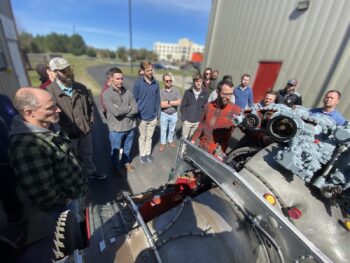2025 Short Course: Introduction to Gas Turbine Engine Mechanical Systems – A Practical Perspective
WHEN and WHERE: 8-10 September, 2025 at Fairfield Inn & Suites Lancaster, 43019 20th St, Lancaster, CA 93536, Phone:
661-902-2030. Class runs from 8:00 to 4:30 the first two days, and from 8:00 to around noon on Weds.
COURSE DESCRIPTION and MATERIALS: The focus of this 20-hour class is foundational understanding of gas turbine engine (GTE) “secondary” or “support” systems – bearings and lubrication, sealing, cooling, heating, controlling, gearing, fuel delivery, starting and engine-driven accessories. These systems are essential for overall engine/application operation yet are often not well understood or covered in college courses. While aviation applications provide the backdrop, most of the material is equally relevant to maritime and ground-based GTE applications. You will leave the class with a newfound, practical perspective of GTE mechanical systems to include improved vocabulary, the important physical principles governing system operation, and the challenging operating, maintenance, and integration environments. Case studies reinforce why these systems are often top drivers of engine readiness, maintenance, and safety issues. With clear learning objectives, the following topics are presented and discussed:
You will be given a set of course notes and a copy of Aircraft Gas Turbine Powerplants Textbook, by Otis and Vosbury. 2.0 Continuing Education Units (CEUs) are awarded.

WHO SHOULD ATTEND: This course is designed for anyone working with GTE applications who wants to gain a practical appreciation for and foundational understanding of these important GTE systems — engineers, scientists, maintenance, repair, overhaul, operational, managers and administrative support personnel. A building-block approach is used — no prior knowledge is assumed. Since 2002, we’ve taught thousands of “students” from audiences across the Air Force, Navy, NASA, and industry. Our instructors have earned a tremendous reputation for teaching foundational, practical aeronautics and propulsion.
Here are a few comments from recent offerings:
“I did not know much about bearings and seals going into the course. Now I feel confident to the point where I can take part in more conversations, and I know enough to ask more questions.”
Dayton, OH
“Knowledgeable, approachable. Great at conveying concepts in an easily understandable and digestible manner.”
Patuxent River, MD
“Knowing how all the secondary systems fit in will better allow me to make informed decisions on making allowances and how they would affect the whole system.”
Oklahoma City, OK
COURSE LEAD: Dr. Keith Boyer is the President for Practical Aeronautics. He retired from the Air Force as a Colonel in 2012 after serving as Associate Dean for Students at the Air Force Institute of Technology. He started his Air Force career in 1979 as an enlisted electronic warfare maintainer on B-52 aircraft and instructor. His aircraft-engine experience includes maintenance & sustainment at the flight line, intermediate and depot levels, research & development, test and analysis, systems engineering, sustainment, logistics & supply chain management, and multinational requirements management. Keith taught for ten years in the Air Force Academy’s Department of Aeronautics and served in numerous leadership positions.
COURSE LEAD: Dr. John Blanton has over 40 years of design, management, and consulting experience in gas turbine heat transfer and secondary air systems design and analysis. He was employed with the General Electric Company for 36 years, including stints at the Global Research Center and at GE Gas Turbine in Schenectady NY, at GE Aviation in Cincinnati OH, and at GE Power in Greenville SC. He is a recognized international expert in the performance analysis of labyrinth seals, and developed the GE analysis code used for this purpose. John is a lifelong member and passionate supporter of ASME and AIAA, and is a Fellow of both organizations.
COST, REGISTRATION, and CANCELLATION POLICY: $1475 ($1425 if registered by Aug 25th), $1405 for Federal Government employees. Group rates available. For more information and to register, visit PracticalAero.com, contact JEllsworth@PracticalAero.com, or call (719) 659-7319. Substitutions may be made at any time. Cancellations must be received two weeks prior to course start date and are subject to a $50 fee. If you must cancel within the two-week period, and do not have a substitute, you may forfeit the entire fee. Refunds of the registration fee (only) are issued if the course is canceled.
Lodging Option: If you would like to stay at the hotel where the course will be held, there is a block of rooms available Reservation-Link
NOTE: This course is an “open enrollment” course and must meet a minimum student count for the offering to be held. If the minimum count is not met, the course will be canceled not later than two weeks prior to the course start date. Practical Aeronautics will not be responsible for any travel/lodging costs incurred by the student if the course is cancelled.
Practical Aeronautics will not be responsible for any costs incurred by the student if the course is cancelled.
Share this course with your colleagues: Download the PDF
2025 – This is the intellectual property of Practical Aeronautics, Inc. (www.practicalaero.com). Please treat accordingly.
